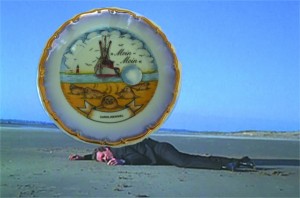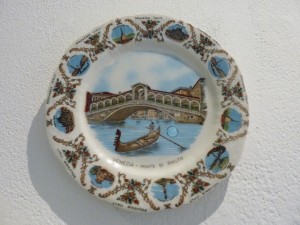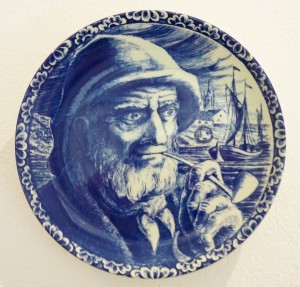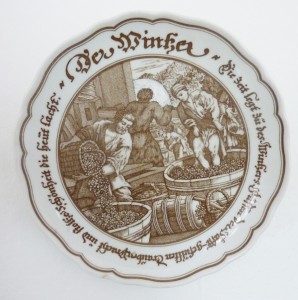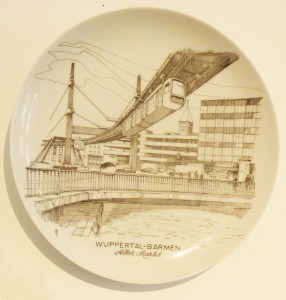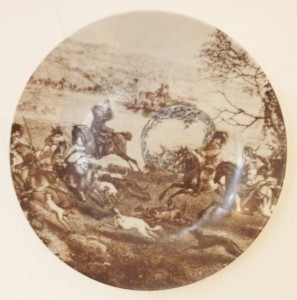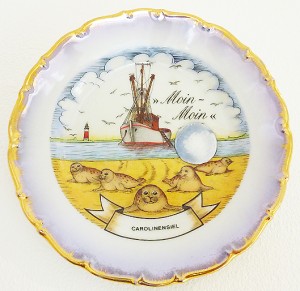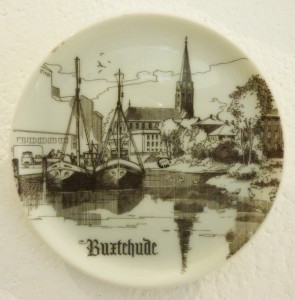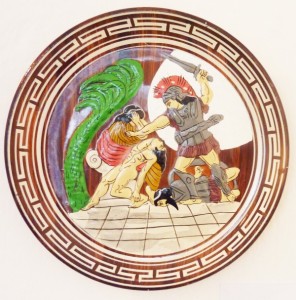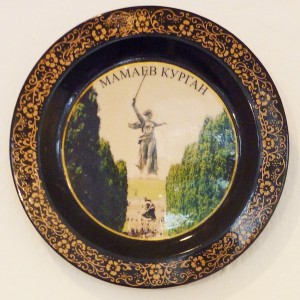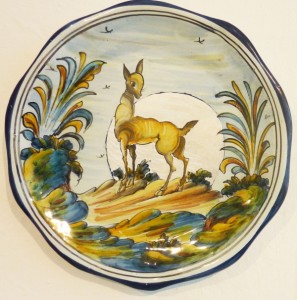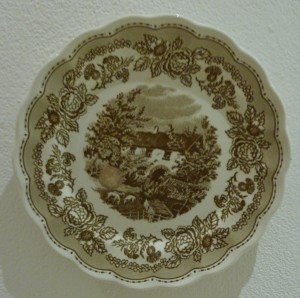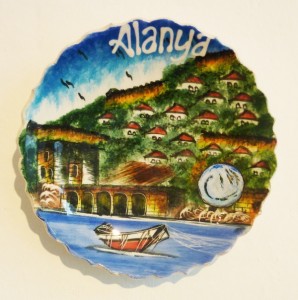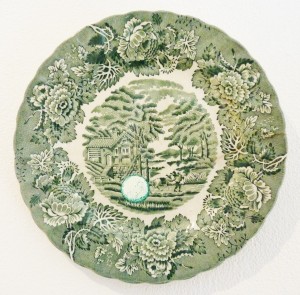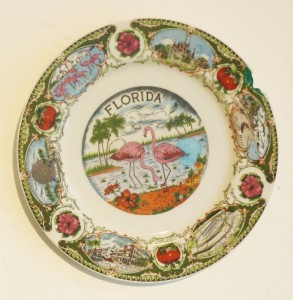A presentation by Semmer Berlin Project Space
This show takes its name from an episode of The Prisoner, a 1967 cult British television series about a British former secret agent who is held in an isolated mysterious coastal village resort, where his captors try to find out why he abruptly resigned from his job.
The Village acts as a microcosm for our various government territories with their own jurisdictions and means for maintaining authority and control. The main work takes its name from the show’s title, MANY HAPPY RETURNS, and extends this notion in an expanded time/space analogy to include many places and political situations in a series of over 25 tourist plates bought from the neighbouring Mauerpark markets. They depict sites of the Global North where global power with its corresponding privilege has been concentrated since the Industrial Revolution. Each are painted to include the Village’s monitoring and security force, a balloon-like device called Rover, that behaves as if it were a self-aware entity.
Rover recaptured those who attempted to escape and could incapacitate through blunt force impacts or through suffocation. The video installation in the show presents a slowed down version of someone suffocated under Rover, and presents a stark contrast to the Rover as a giant balloon serenely invigilating the gallery space.
Rover strategically helped maintain the people’s role in their own self-government, allowing for the construction of auto-regulated or auto-correcting citizens. Foucault describes this process as governmentality, which refers to a variety of historical periods and to different specific power regimes in relation to the calculated means of directing how we behave and act. Power is de-centred and the knowledge produced means members play an active role. Oestreich (1992: 156) outlines that police is not simply a form of the ‘regulation mania’ of police but is identical both with the government and with the object and nature of the community as a whole.
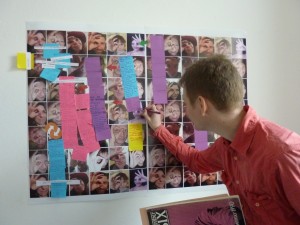 Each of the plates includes a short text to provide a local example of how a past or present administration has exerted power either positively or negatively in the interests of citizen individual rights and the collective commons. In some instances an example of valuable creative resistance has been mentioned instead. These examples are taken up as possible end points to the collaborative work BE SEEING YOU made with sociologist Dr Sacha Kagan, who I invited into the challenge to provide systems thinking and ‘sustainability science’ methodologies to map the complex Village situation in an attempt to assist The Prisoner to escape.
Each of the plates includes a short text to provide a local example of how a past or present administration has exerted power either positively or negatively in the interests of citizen individual rights and the collective commons. In some instances an example of valuable creative resistance has been mentioned instead. These examples are taken up as possible end points to the collaborative work BE SEEING YOU made with sociologist Dr Sacha Kagan, who I invited into the challenge to provide systems thinking and ‘sustainability science’ methodologies to map the complex Village situation in an attempt to assist The Prisoner to escape.
Drawing from the work of Bruno Latour, in an article written about the show, Dr Kagan discusses how the TV series critiques the illusions of ‘freedom’ as emancipation from attachments. “Freedom from is inseparable from power over. If we take this seriously, then we shall also relinquish ‘freedom from’, and instead rethink what could be a ‘freedom with’. This is not a freedom of emancipation, of independence, but a freedom of interdependence, a freedom to re-attach ourselves. ‘Freedom with’ lies not in escaping from the village, but in transforming what happens both inside the village and in the relations between the village and the world system in which it is embedded.” The full article can be read at Cultura21. The exercise is done on a mosaic of portraits where Villagers signal the gesture that accompanies their farewell BE SEEING YOU.
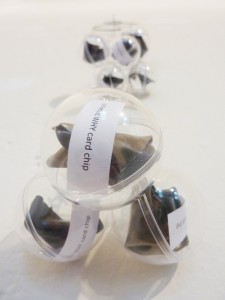
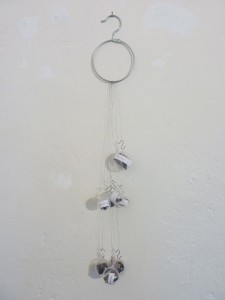 Another work focuses on issues relating to education, where Villagers can obtain a university level degree in 3 minutes when wired to a giant computer. The Prisoner is invited to ask the computer a question that he believes it cannot solve. He types the question W-H-Y-? onto a metal card and when he inserts it into the computer it self-destructs. This work takes it name from the question and like the plate project, is presented in a tourist junk culture response, where the broken chips of the metal question card are presented as small trinkets as can still be found at Mauerpark’s markets with the overpackaged chips of the neighbouring Berlin wall.
Another work focuses on issues relating to education, where Villagers can obtain a university level degree in 3 minutes when wired to a giant computer. The Prisoner is invited to ask the computer a question that he believes it cannot solve. He types the question W-H-Y-? onto a metal card and when he inserts it into the computer it self-destructs. This work takes it name from the question and like the plate project, is presented in a tourist junk culture response, where the broken chips of the metal question card are presented as small trinkets as can still be found at Mauerpark’s markets with the overpackaged chips of the neighbouring Berlin wall.
Individual plates with text comprising MANY HAPPY RETURNS
|
Belgium Malika El Aroud (aka Umm Obeyda) is a Moroccan-born Belgian Muslim activist known for her Islamist writings on the Internet. El Aroud has been called a danger by a European terrorism expert because her high profile advocacy has made her a role model and a source of inspiration to female jihadists. She is the widow of Dahmane Abd al-Sattar, a.k.a. Abdessatar Dahmane, one of the men who killed anti-Taliban leader Ahmad Shah Massoud two days before the September 11, 2001 attacks. According to CNN, she admitted in 2008 that she was devoted to Osama bin Laden. |
Corporations
What if the new capitalism produced a new kind of feudalism? Indeed, as products are increasingly replaced by immaterial experiences, and are licensed rather than sold, then this means that consumers will no longer ‘own’ anything, merely a right to use it, and that those without means will be excluded from access to these networks. Jeremy Rifkin – The Age of Access: The New Culture of Hypercapitalism, Where all of Life is a Paid-For Experience |
|
In the Czech Republic, a group of advertising professionals started a website against Santa Claus. “Czech Christmases are intimate and magical. All that Santa stuff seems to me like cheap show business,” said David König of the Creative Copywriters Club, pointing out that it is primarily an American and British tradition. “I’m not against Santa himself. I’m against Santa in my country only.” In the Czech tradition, presents are delivered by Ježíšek, which translates as Baby Jesus. |
Estonia
On 1 January 2013, Tallinn became the largest European city and the first European capital to provide free public transport to its residents. The initial results of the move are encouraging: the use of public transport in Tallinn has already increased by 10% while traffic in city centre has reduced by 15%. |
|
As part of the Occupy Movement some 300 protesters started occupying Paris’s financial district, La Défense, on 4 November 2011. Since then, their camp has been torn down by several police forces. According to French protestors, relations with the police have varied considerably. Some police joined them for coffee and friendly discussion, but otherwise were hostile and confiscated blankets and food, leaving protesters sleeping in the cold outdoors without protection. On 11 November, following a call made on social networks, some 400 additional people joined the occupation. Occupy protests have also begun at Nantes, Lyon, Grenoble, Marseille, Perpignan and more than 50 cities. |
Germany – Munich The Munich massacre is a common reference name for an attack that occurred during the 1972 Summer Olympics in Munich, when 11 members of the Israeli Olympic team were taken hostage and eventually killed and a German police officer, by the Palestinian group Black September. Shortly after the crisis began, they demanded the release of 234 prisoners held in Israeli jails, and the release of the founders (Andreas Baader and Ulrike Meinhof) of the German Red Army Faction, who were held in German prisons. Black September called the operation “Ikrit and Biram”, after two Christian Palestinian villages whose inhabitants were expelled by the Haganah in 1948. The attackers were apparently given logistical assistance by German neo-Nazis. Five of the eight members of Black September were killed by police officers during a failed rescue attempt. The three surviving assassins were captured, but later released by West Germany following the hijacking by Black September of a Lufthansa airliner. Israel responded to the killers’ release with Operation Spring of Youth and Operation Wrath of God, during which Israeli intelligence and Special Forces systematically tracked down and killed Palestinians suspected of involvement in the massacre. |
|
Silke Helfrich, based in Jena near Wuppertal, headed the Regional office of the Heinrich Böll Foundation for Central America, Mexico and the Caribbean from 1999 to 2007, focusing on globalization, gender and human rights. Helfrich has developed an international reputation for her commons advocacy through her German-speaking Commonsblog (http://www.commonsblog.de); her recent book anthology of essays on the commons, Who Owns the World? The Rediscovery of the Commons, published in German, Spanish and partly English; and her articles, reports (especially “Commons: Prosperity by Sharing,” written with Rainer Kuhlen, Christian Siefkes and Wolfgang Sachs in 2010); and her consulting on the commons with civil society and academic organizations. Helfrich speaks regularly about the commons in academic settings, political and ecumenical institutions and NGO/grassroots movement events mostly in Europe and Latin America. http://www.commonsstrategies.org/content/who-we-are |
Germany
Banality of evil is a phrase used by Hannah Arendt in the title of her 1963 work Eichmann in Jerusalem: A Report on the Banality of Evil. Her thesis is that the great evils in history generally, and the Holocaust in particular, were not executed by fanatics or sociopaths, but by ordinary people who accepted the premises of their state and therefore participated with the view that their actions were normal. |
|
The Lower Saxon Wadden Sea National Park (Nationalpark Niedersächsisches Wattenmeer) was established in 1986 and in June 2009 it has become a UNESCO World Heritage Site along with the Schleswig-Holstein Wadden Sea and the Dutch Wadden Sea. In January 2002 the East Frisian conservation group Wattenrat Ost-Friesland complained to the EU Commission in Brussels about the removal or downgrading of more than 80 areas in order to support tourism and the appeal was incorporated by the Commission into ongoing infringement proceedings against Germany. After more than four years, the EU Commission informed the Wattenrat-Ostfriesland in October 2006 that the complaint was closed “because the Federal Republic of Germany had identified sufficient areas which are proposed as Special Areas of Conservation. The conservation group argued that this did not make sense from a nature conservation perspective, as the national park belonged to a previously designated special area of conservation and bird reserve and that, contrary to the provisions of the Natura 2000 directive, it was now in a worse state of repair. It claimed the EU was supporting largely economically motivated changes to the national park to provide additional tourist facilities at the cost of valuable plant habitats and bird breeding or migration sites. In 2008, the Wadden Sea in Lower Saxony and Schleswig Holstein was proposed to UNESCO for nomination as a UNESCO World Heritage Site. Since 2003 the President of the German UNESCO Commission has been Walter Hirche (FDP), the former Economic Minister in Lower Saxony from 2003 to 2009. Prior to the nomination of the Wadden Sea as a UNESCO World Heritage Site, an inspection visit was held by a senior officer of the Swiss-based International Union for the Conservation of Nature (IUCN) was held in summer 2008, together with representatives of the tourism industry in and around the Wadden Sea. Following this, there were newspaper reports claiming that the UNESCO nomination was an “internationally effective marketing tool for the tourism industry” and that additional restrictions imposed for conservation purposes were not involved. On 26 June 2009, the Wadden Sea National Park was recognised as a UNESCO World Heritage Site in Seville, along with the Dutch Wadden Sea and the Schleswig-Holstein Wadden Sea National Parks. Hamburg and Denmark have so far refused to allow their mudflats to be nominated. |
Germany – Buxtehude
One Sunday morning in Buxtehude at harvest time, the hedgehog started down the path to the field. He hadn’t gone very far when he met up with the hare and when the hedgehog saw the hare, he wished him a friendly good morning. The hare responded in a sarcastic manner and made fun of the hedgehog’s crooked legs. The hedgehog challenged the hare to a race and they organised to meet back at the spot in a half hour. The hedgehog went back home and brought back his wife and told her to stand in the furrow and to call out to the hare when he approached from the other side, ‘I’m already here.'” When the hedgehog arrived the hare was already there. The hare counted “One, two, three,” and he tore down the field like a windstorm. The hedgehog ran only about three steps and then ducked down in the furrow and remained there sitting quietly. When the hare arrived at the bottom of the field, the hedgehog’s wife called out to him, “I’m already here!” The hare, startled and bewildered, thought it was the hedgehog himself, for as everyone knows, a hedgehog’s wife looks just like her husband. The hare thought something was not right and called out “Let’s run back again!” When the hare arrived at the top the hedgehog called out to him “I’m already here!” The hare beside himself shouted, “Let’s run back again!” So the hare ran seventy-three more times, but the hare did not complete the seventy-fourth time. In the middle of the field, with blood flowing from his neck, he fell dead to the ground. The hedgehog called his wife from her furrow and happily they went back home. |
|
Prime Minister Antonis Samaras has started selling off some of the country’s islands as part of a state-asset sales plan to receive international funds. http://www.guardian.co.uk/world/2013/mar/14/eurozone-crisis-greece-job-cuts |
Iceland
When reading about Iceland’s good standing, compared to many other countries, the usual comment is that Iceland didn’t bail out its three large banks that all collapsed in October 2008. The Government tried to save Glitnir at the end of September but failed miserably. This attempt made it abundantly clear that it was beyond the Central Bank of Iceland to be a lender of last resort for these three because of the size of the Icelandic economy. The Government was unable to do anything but watch in horror – but a lot of the undergrowth in the financial system has been saved. http://uti.is/2011/11/iceland-successful-recovery-and-the-non-bail-out-banking-myth/ But did we do something right? Yes, we did! |
|
Rita Atria (Partanna, September 4, 1974 – Rome, July 26, 1992) was a witness in a major Mafia investigation in Sicily, breaking the Omertà – code of silence. She committed suicide in July 1992, a week after the Mafia killed the prosecutor Paolo Borsellino, with whom she had been working. |
Italy
Luigi de Magistris (born 20 June 1967) is the Mayor of Naples and a former prosecutor. He appointed an Assessor of the Commons to monitor and improve local commons. He recently hosted a major conference on the commons for Italian municipal officials, and has instigated a move to have a voter initiative on a European Charter on the Commons. This effort aspires to collect one million signatures in order to get a voter initiative on the commons on ballots throughout Europe, with the goal of giving explicit legal protection to various commons. The precise legal terms of the Charter are currently being worked out. http://www.bollier.org/surveying-commons-activism-international-stage |
|
Mehdi Shahbazi was a Shell station operator in central California who posted signs in 2005 stating “Big oil’s unearned profit” in protest of zone pricing. Shell sued Shahbazi saying that the protest violated the terms of his lease. Shahbazi responded by accusing the company of “breach of contract and of violating the Petroleum Marketing Prices Act”. Shell then terminated his contract. A federal judge ruled in favour of Shell and Shahbazi was ordered to vacate the station. Shahbazi died on November 14, 2007, due to liver failure, which was a result of a hunger strike.
|
Poland
On October 16, 1978, the Bishop of Kraków, Karol Wojtyła, was elected Pope John Paul II. He was the second-longest serving Pope in history and the first non-Italian since 1523. A very charismatic figure, John Paul II was acclaimed as one of the most influential leaders of the 20th century. He is credited with helping to end Communist rule in his native Poland and eventually all of Europe. John Paul II significantly improved the Catholic Church’s relations with Judaism, Islam, the Eastern Orthodox Church, and the Anglican Communion. Though criticised by progressives for upholding the Church’s teachings against artificial contraception and the ordination of women, and by traditionalists for his support of the Church’s Second Vatican Council and its reform, he was also widely praised for his firm, orthodox Catholic stances. |
|
The original Mamayev Kurgan was a Tartar burial mound 102 metres high. After the Battle of Stalingrad (now Volgograd), the Soviet authorities commissioned the enormous Mamayev Kurgan memorial complex. Most Tatars live in the Russian Federation, with a population of 5.5 million.Yusuf Akçura was a prominent Tatar activist and ideologue of Turanism in the late Ottoman Empire. Turanism, or Pan-Turanism, is a political movement for the union of all Turanian peoples. It implies not merely the unity of all Turkic peoples (as in Pan-Turkism), but also the unification of a wider Turanid race, also known as the controversial Uralo-Altaic race, believed to include all peoples speaking “Turanian languages”. The idea of a Turanic family of languages and Turanic people was put forward and promoted by the German linguist Max Müller, Turkish proponents of scientific racism claimed that this racial group embraced the Ottoman Turks of Istanbul and Anatolia, the Turcomans of Central Asia and Persia, the Tartars of South Russia and Transcaucasia, the Magyars of Hungary, the Finns of Finland and the Baltic, the aboriginal tribes of Siberia and even the distant Mongols and Manchus. |
Spain
The history of the anarchist collective in Spain reveals that the experiments in workers’ self-management (syndicalism), both urban and rural, involved over 300 interdependent bartering systems operating that lasted 18 months, in 1936-37, until their ‘allies’ the socialists and Stalinists came with armed forces and repressed it and installed a dictatorship. The Anarchist Collectives: Workers’ Self-management in the Spanish Revolution 1936-1939, Sam Dolgoff |
|
The Swiss National Bank, the largest gold distribution centre in continental Europe before the war, was the logical venue through which Nazi Germany could dispose of its gold. During the war, the Swiss National Bank received $440m in gold from Nazi sources, of which $316m is estimated to have been looted. “Toward the end of the war, when other neutral states refused to purchase gold directly from Germany, Switzerland continued to carry on this highly profitable trade. That gold generally came from two sources – the gold reserves of the central banks of the occupied countries and gold taken from individuals – including gold dental fillings extracted from corpses.” |
Turkey
In the early 1970s, when fish stocks ran low in Alanya, a system of rotating access was developed to preserve this sector. This innovative system was part of Elinor Ostrom’s research on economic governance that led to her 2009 Nobel Prize in Economics. Her work demonstrated how common resources such as forests, fisheries, oil fields or grazing lands can be managed successfully by the people who use them rather than by governments or private companies. |
|
United Kingdom Margaret Thatcher was the longest-serving (1979–1990) Prime Minister of the United Kingdom of the 20th century, and the only woman ever to have held the post. She introduced cash limits on public spending, and reduced expenditure on social services such as education and housing. Her cuts in higher education spending resulted in her being the first Oxford-educated post-war Prime Minister not to be awarded an honorary doctorate by the University of Oxford. Thatcher reformed local government taxes by replacing domestic rates—a tax based on the nominal rental value of a home—with the Community Charge (or poll tax) in which the same amount was charged to each adult resident. Thatcher was committed to reducing the power of the trade unions, whose leadership she accused of undermining parliamentary democracy and economic performance through strike action. After the 1983 election the sale of state utilities accelerated. Although saying that she was against apartheid, Thatcher stood against the sanctions imposed on South Africa by the Commonwealth and the EC. The Thatcher government supported the Khmer Rouge keeping their seat in the UN after the Cambodian–Vietnamese War, ousted them from power in Cambodia. Although denying it at the time they also sent the SAS to train the Khmer Rouge alliance to fight against the Vietnamese-backed People’s Republic of Kampuchea government. In July 1992 the tobacco company Philip Morris hired Thatcher as a “geopolitical consultant” for $250,000 per year and with an annual contribution of $250,000 to her foundation. She also earned $50,000 for each speech she delivered. In 1998 Thatcher called for the release of former Chilean dictator Augusto Pinochet when Spain had him arrested and sought to try him for human rights violations, citing the help he gave Britain during the Falklands War. In 1999, she visited him while he was under house arrest near London. Pinochet was released in March 2000 on medical grounds by the Home Secretary Jack Straw without facing trial. She has been criticised as being divisive and for promoting greed and selfishness. Despite being Britain’s first woman Prime Minister, some critics contend Thatcher did little to advance the political cause of women either within her party or the government, and some British feminists regarded her as “an enemy”. Her stance on immigration was perceived as part of a rising racist public discourse. |
United Kingdom
Adam Wakeling searched through a list of the top 200 people who could potentially assist most with reducing carbon emissions and found Mike Hands, a scientist living in Devon, who developed a sustainable farming technique to replace slash and burn farming in equatorial forests that could save more carbon emissions annually than all global aviation combined. Filmed over 4 years in Honduras and the UK, his film called Up in Smoke, assisted the Inga Foundation to receive big Hollywood backing for an international education program as well as widespread support from the political and scientific fields. |
|
On June 7, 1977, Anita Bryant’s campaign led to a repeal of the anti-discrimination ordinance by a margin of 69 to 31 percent. However, the success of Bryant’s campaign galvanised her opponents and the gay community retaliated against her by organising a boycott of orange juice. Gay bars all over North America took screwdrivers off their drink menus and replaced them with the “Anita Bryant”, which was made with vodka and apple juice. Sales and proceeds went to gay civil rights activists to help fund their fight against Bryant and her campaign. The fallout from her political activism hurt her business and entertainment career. Her contract with the Florida Citrus Commission was allowed to lapse in 1979 because of the controversy and the negative publicity generated by her political campaigns and the resulting boycott of Florida orange juice. |
Wales
George Monbiot is an activist who lives in the mid-Wales market town of Machynlleth. Monbiot has written that climate change has made an urgent need for a raft of emergency actions he believes will stop climate change, including: setting targets on greenhouse emissions using the latest science; issuing every citizen with a ‘personal carbon ration’; new building regulations with houses built to German passivhaus standards; banning incandescent light bulbs, patio heaters, garden floodlights, and other inefficient technologies and wasteful applications; constructing large offshore wind farms; replacing the national gas grid with a hydrogen pipe network; a new national coach network to make journeys using public transport faster than using a car; all petrol stations to supply leasable electric car batteries with stations equipped with a crane service to replace depleted batteries; scrap road-building and road-widening programs, redirecting their budgets to tackle climate change; reduce UK airport capacity by 90%; closing down all out-of-town superstores and replacing them with warehouses and a delivery system. Monbiot also thinks that the rational policy for the governments of the rich world is now to keep growth rates as close to zero as possible. |
| All references from wikipedia unless otherwise stated. |
